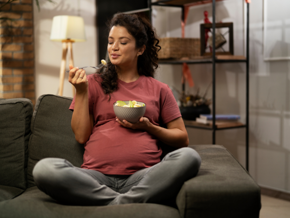
Morning Sickness
Amid your joy about your pregnancy, you may experience morning sickness – nausea with or without vomiting, that can occur any time of the day or night. Some women don’t get it, some feel it now and then, others are sick several times a day. Generally, it settles after the third month.
Causes of morning sickness
Morning sickness is often one of the first signs of pregnancy. So what causes it? During the first trimester, a rise in hormone levels (progesterone and oestrogen) causes your sense of taste to change and makes your sense of smell more acute. For many women, this leads to common morning sickness symptoms of nausea and vomiting. Stress and anxiety may also play a role in this hypersensitivity. Relief from morning sickness for most women arrives around the start of the second trimester, however some women who experience severe morning sickness can unfortunately experience symptoms throughout their entire pregnancy. You should seek guidance from your healthcare professional if you are ever concerned about morning sickness or the symptoms are becoming unmanageable.
Morning sickness relief and remedies
In short there is no quick fix – other than once your baby is born! Here are some morning sickness tips to help you survive though:
- Eat frequent, small nutritious meals. Taking little meals throughout the day will help keep your blood sugar levels steady and keep your stomach filled to minimise that queasy feeling.
- For breakfast, opt for slow-release carbohydrates (whole grain cereals & breads; eggs on toast, etc.).
- Snack smart. Eat foods such as crackers, wholegrain toast, a hot baked potato, cooked pasta, cooked rice or fruit.
- Avoid rich and greasy foods which may sit in the stomach longer.
- Get enough sleep – Sleep helps your body rest, renew itself, and helps relax you. Women who don’t get enough rest may experience worse nausea.
- Avoid stress, if you do experience nausea and vomiting during your pregnancy, you want to be able to manage it and being stressed isn’t going to help.
- Get out of bed slowly. An abrupt change from lying flat to standing increases the feeling of dizziness.
- Go easy on spicy foods. Dishes prepared with chilli and garlic may aggravate your pregnancy nausea.
- Reduce smells. Keep your kitchen well-ventilated to exhaust lingering cooking odours. Try eating cold foods as they have less odour and may be easier to swallow.
- Drink water or suck on ice. This helps you avoid dehydration if you’ve been vomiting. Contact your doctor if you vomit more than twice daily.
- Exercise. It will help you relieve the stress that may be contributing to your morning sickness and may also help you sleep better at night.
Talk to your doctor if you are concerned about your morning sickness, there may be other options you had not thought of such as anti-nausea medication that is safe through pregnancy.
Frequently asked questions about morning sickness
When does morning sickness start?
Morning sickness can start any time after conception, however it typically starts for most women around the sixth week of pregnancy. It may continue until the end of the first trimester or even further for some women with severe morning sickness. If you have concerns about your morning sickness, it's best to consult a healthcare professional for personalised advice.
What causes morning sickness?
Despite its name, morning sickness can strike at any time of the day or night. The exact cause of morning sickness is unknown, but it is likely a sign that the body is adjusting to hormonal shifts. Pregnancy hormones that could affect morning sickness are human chorionic gonadotropin (hCG, the hormone that pregnancy tests detect), oestrogen, progesterone, or thyroid.
How can I stop feeling nauseous in pregnancy?
Feeling nauseous in pregnancy is a very common rite of passage for most women. To ease feeling nauseous in pregnancy, consider eating small, frequent nutritious meals, staying hydrated, and avoiding strong odours. There are plenty of herbal and alternative ‘remedies’ and ‘morning sickness tips’ available on the internet but it’s very important you consult a healthcare professional for personalised advice and potential treatment options that are specifically suitable for you and your baby.
What relieves morning sickness?
The good news is that most morning sickness doesn’t last and morning sickness relief will come eventually. To help alleviate nausea during pregnancy, consider eating small, frequent nutritious meals, staying hydrated, and avoiding strong odours or spicy foods. You should consult of healthcare professional before trying any alternative treatments including herbal supplements and teas as they may not all suit you and your baby.
When does morning sickness stop?
For most women, it is normal to experience morning sickness during the first trimester. After this time symptoms start to ease or go away completely, and most women have passed this stage by the second trimester. If you’re still feeling sick in third trimester it may not be linked to morning sickness and is something you should get checked out with your healthcare professional.
Is it normal to not have morning sickness?
While pregnancy and morning sickness is quite synonymous, some women won’t experience it, and this is very normal too and does not necessarily indicate a problem. If you have concerns, it's best to consult a healthcare professional for personalised advice and reassurance.
How to stop feeling sick in third trimester?
Some women who experience severe morning sickness can still be feeling sick in the third trimester. This is not common, and you should hopefully have had these symptoms checked out by a healthcare professional before the third trimester. If you are still feeling sick in third trimester due to morning sickness, continue to eat small, frequent meals, avoid spicy or greasy foods, and stay hydrated. Additionally, getting plenty of rest and practicing relaxation techniques may provide relief.
Sources:
- Health Direct Website. Accessed at https://www.healthdirect.gov.au/dealing-with-morning-sickness
- Royal Australian College of General Practitioners Website. Accessed at https://www.racgp.org.au/afp/2016/august/managing-nausea-and-vomiting-in-pregnancy-in-a-pri





